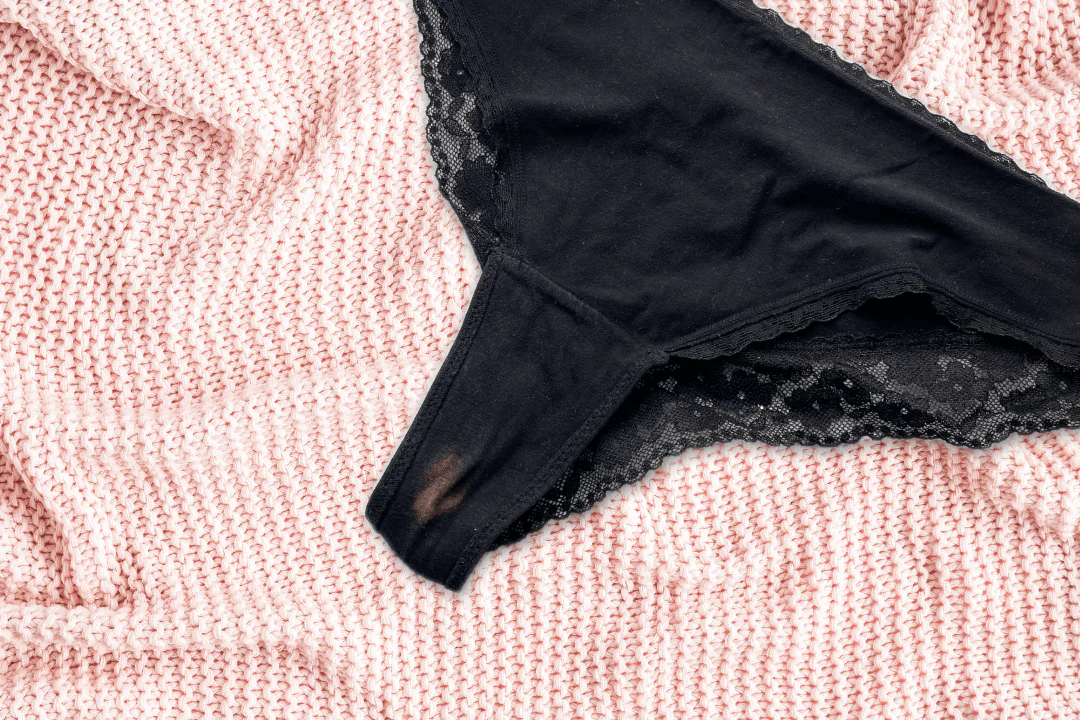It’s not your washing machine, and it’s not because you’ve over-worn them—your vagina is actually capable of ‘bleaching’ your underwear.
But don’t worry, it’s completely normal.
Why are there ‘bleached’ spots on your underwear?
The discharge your vagina produces—which, by the way, is totally healthy and normal—tends to be naturally acidic.
This can leave white or yellowish stains on the crotch of your underwear.
The pH level of vaginal discharge generally ranges from 3.5 to 7, and it’s on the acidic side when everything is working as it should.
A healthy vagina produces more acidic discharge, but this can change depending on things like hormones, your sex life, and your menstrual cycle.
You might not notice these stains as much when you wear lighter-colored underwear.
But with black underwear, these little bleached patches become pretty obvious, while white underwear may show faint yellowish stains.

There’s no need to stress about this.
Dr. Alex Eskander, a consultant gynaecologist at The Gynae Centre, told Metro.co.uk:
“The vagina contains ‘good’ bacteria, like lactobacilli, which keeps the vagina healthy by maintaining the optimum acidity level, in turn preventing bad bacteria from causing infection.
“This discharge increases during ovulation and pregnancy due to an increase in cervical mucus.
“When exposed to the air, the discharge can stain underwear a mild yellow colour due to oxidation.
“Having bleached patches on your underwear is quite normal and generally nothing to worry about.”
How to prevent ‘bleach’ stains in your underwear
Like we mentioned, those bleached patches on your underwear aren’t anything to lose sleep over.
But if you’re tired of seeing your favorite black undies getting ruined, there are a few things you can do to keep them looking fresh.
First, you could start wearing pantyliners during the day.
This creates a barrier between your vulva and your underwear, preventing the slightly acidic discharge from coming into direct contact with the fabric.
Just spray the affected area, let it soak for a couple of hours, and then toss it in the wash.
And, of course, if you’re determined to restore your black underwear to their original color, you can always try re-dyeing them at home. Simple fix.
Is your discharge normal?
Whenever we talk about discharge, the same question often comes up: Is my discharge normal?
Let’s address that.
Yes, having vaginal discharge is completely normal and a sign of a healthy body. On average, you’ll produce around 4ml of discharge a day.
Discharge is actually part of the vagina’s amazing self-cleaning process. It’s a type of mucus produced by the cervix to help keep everything in balance.
Dr. Virginia Beckett, spokesperson for the Royal College of Obstetricians and Gynaecologists, told Metro.co.uk: “It’s normal and healthy for a woman to produce a clear or white discharge from her vagina.
However, if there’s a strong odor or a noticeable change in smell, it could be a sign of irritation or infection, and it’s a good idea to see your doctor or gynecologist.




